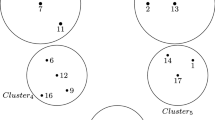Abstract
In this paper, a new structure for cooperative learning automata called extended learning automata (eDLA) is introduced. Based on the new structure, an iterative randomized heuristic algorithm using sampling is proposed for finding an optimal subgraph in a stochastic edge-weighted graph. Stochastic graphs are graphs in which the weights of edges have an unknown probability distribution. The proposed algorithm uses an eDLA to find a policy that leads to a subgraph that satisfy some restrictions such as minimum or maximum weight (length). At each stage of the proposed algorithm, the eDLA determines which edges should be sampled. The proposed eDLA-based sampling method may reduce unnecessary samples and hence decrease the time required for finding an optimal subgraph. It is shown that the proposed method converges to an optimal solution, the probability of which can be made arbitrarily close to 1 by using a sufficiently small learning parameter. A new variance-aware threshold value is also proposed that can significantly improve the convergence rate of the proposed eDLA-based algorithm. It is further shown that our algorithm is competitive in terms of the quality of the solution.











Similar content being viewed by others
References
Narendra K. S., Thathachar M. L. A. A. (1974) Learning automata-a survey. IEEE Trans on Syst, Man Cybern (4),323–334
Thathachar ML, Sastry PS (2002) Varieties of learning automata: An overview. IEEE Transactions on Systems, Man, and Cybernetics. Part B, Cybernetics: A publication of the IEEE Systems, Man, and cybernetics society 32:711–22
Meybodi M, Beigy H (2001) A sampling method based on distributed learning automata for stochastic shortest path problem. In: the 10th Iranian conference on electrical engineering, vol I
Jahanshahi M, Dehghan M, Meybodi MR (2012) LAMR: learning automata based multicast routing protocol for multi-channel multi-radio wireless mesh networks. Appl Intell 38:58–77
Yazidi A, Granmo O-C, Oommen BJ (2011) Service selection in stochastic environments: A learning-automaton based solution. Appl Intell 36:617–637
Beigy H, Meybodi M (2003) Solving stochastic shoretst path problem using Monte Carlo sampling method: a distributed learning automata approach. Springer-Verlag lecture notes in advances in soft computing: Neural networks and soft computing, pp 626– 632
Beigy H, Meybodi M R (2006) Utilizing distributed learning automata to solve stochastic shortest path problems. International Journal of Uncertainty, Fuzziness and Knowledge-Based Systems 14:591–615
Mollakhalili Meybodi M, Meybodi MR (2004) A New Distributed Learning Automata Based Algorithm for Solving Stochastic Shortest Path. In: 6th conference on intelligent systems, (kerman)
Alipour M, Meybodi M (2005) Solving traveling salesman problem using distributed learning automata. In: Proceedings of 10th Annual CSI Computer Conference, (Tehran, Iran), pp 759–761
Motevalian A, Meybodi M (2006) Solving maximal independent set problem using distributed learning automata. In: 14th Iranian electrical engineering conference (ICEE2006), vol 1. Tehran
Saati S, Meybodi M (2005) A self organizing model for document structure using distributed learning automata. In: Second international conference on information and knowledge technology (IKT2005)
Anari B, Meybodi MR (2007) A Method based on distributed learning automata for determining web documents structure. In: 12th annual CSI computer conference of Iran, pp 2276– 2282
Mollakhalili Meybodi M, Meybodi M (2008) Link prediction in adaptive web sites using distributed learning automata. In: 13th annual CSI computer conference of Iran, Kish Island
Mollakhalili Meybodi M, Meybodi M R (2012) A distributed learning automata based approach for user modeling in adaptive hypermedia. In: Congress on electrical, computer and information technology, Mashhad
BaradaranHashemi A, Meybodi M (2007) Web Usage Mining Using Distributed Learning Automata, In: 12th Annual CSI Computer Conference of Iran, Tehran, pp 553–560
Akbari Torkestani J (2012) An adaptive focused web crawling algorithm based on learning automata. Appl Intell 37:586–601
Thathachar B, Harita MAL (1987) Learning automata with changing number of actions. IEEE Trans Syst Man Cybern Syst Hum 17(6):1095–1100
Sato T (1999) On some asymptotic properties of learning automaton networks. Techical Report
Lakshmivarahan S, Thathachar M (1976) Bounds on the convergence probabilities of learning automata. IEEE Trans Syst Man Cybern Syst Hum 6(11):756–763
Norman F (1968) On the linear model with two absorbing. J Math Psychol 5:225–241
Zhang X, Granmo O-C, Oommen B J, Jiao L (2014) A formal proof of the 𝜖-optimality of absorbing continuous pursuit algorithms using the theory of regular functions. In: Applied intelligence
Akbari Torkestani J (2012) An adaptive focused Web crawling algorithm based on learning automata. Appl Intell 37:586–601
Narendra, Kumpati S., M. L. A. A. Thathachar (1989) Learning automata: An introduction. Prentice Hall, Englewood Cliffs
Ross SM (2004) Introduction to probability and statistics dor engineers and scientists, 3rd edn. Elsevier Academic Press
Papoulis A (1991) Probability, random variables, and stochastic processes, 3rd edn., McGrawHill
Hutson K R, Shier D R (2005) Bounding distributions for the weight of a minimum spanning tree in stochastic networks. Oper Res 53(5):879–886
Akbari Torkestani J, Meybodi M R (2011) Learning automata-based algorithms for solving stochastic minimum spanning tree problem. Appl Soft Comput 11:4064–4077
Author information
Authors and Affiliations
Corresponding author
Rights and permissions
About this article
Cite this article
Mollakhalili Meybodi, M.R., Meybodi, M.R. Extended distributed learning automata. Appl Intell 41, 923–940 (2014). https://doi.org/10.1007/s10489-014-0577-2
Published:
Issue Date:
DOI: https://doi.org/10.1007/s10489-014-0577-2




